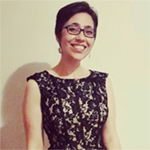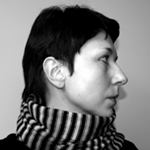Scherzo: Romka and America
Romka discovered America. America discovered Romka. So, continent after continent, Romka and America discovered one another.
America was born on October 12, 1492: she was much older than Romka, true, though she had no reason to suspect it. To Romka, America was formed by two mainlands—North and South. She drew a border: with the Dariensky Isthmus and the Panama Canal she separated herself from those pesky outsiders.
“You are My New World!” Romka often told America.
“What are you copying Vespucci for? He would call me that.”
“You’re My New World!” smiled Romka, and pushed aside the book about the seafarer who christened the southern part of her America his New World. Romka was happy that it was, at least, only a part, because she’d claim something for herself and no one would dare stop her.
“Do you also dream of finding the shortest sea route to India? Do you wish to be a Columbus as well?” wondered the undiscovered part of America, Not-North-Not-South. “Do you have three caravels? Will you sail the Atlantic on three ships?”
“I don’t know,” smiled Romka. “Do you need me to do that too?”
“Once there was a man, his name is somewhere in the reference books now, who discovered me. He had three caravels—Santa Maria, Pinta, Niña. He reached the Sargasso Sea, and then the Samana Cay on my birthday.”
“When is your birthday?”
“October 12, 1492. But I’d like to change the date. I want to change it to today—I’ve been born again! No, I’ve been born alive…”
“How ancient you are.”
“Who are you?” America melted under Romka’s gaze. “Why is it so easy, so good, for me to be around you? Where did you come from? Your name holds half the world—Roma, Rome, Roman de la Rose, Romantism, romance, Romanche…”
“What’s Romanche?” asked Romka.
“A trench in the Atlantic, not far from the equator. It’s an abyss. Do you want to see?” America had already opened a fat book before Romka had the chance to stop her. “Look, I found it! 190 miles long, 12 miles wide, 25,463 feet deep! But you… You’re—bigger. Wider. Deeper! I can’t go on without you. You are my eternal city, my Rome! You stand upon me like the Tiber! Your struggle for infinite freedom is boundless. Though your dream is far from reality…”
“You are my dream. You are real,” Romka took America in her arms, forgetting about the isthmus separating the North and the South: Romka’s America was Not-North-Not-South, and so—was her own. She was the one that Romka alone had discovered.
“You know,” America stretched out dreamily, “you know, I just can’t understand why—” but the Atlantica wind drowned out her words; Romka nuzzled back-to-back with America, and whispered ardently:
“I discovered you, you hear me? Dis-cov-ered! I discovered you like no one before ever had: they couldn’t! And no one will ever be able to again! You’re the most real of all the Americas, the only one! Not-North-Not-South!”
“Do you want some rum?” America suddenly asked Romka. “Sometimes we need this fermented sugar juice more than water.”
“I want everything with you,” Romka answered simply. “Everything. How could I live without you? It’s already been long enough.” Romka raised the steel mug to her lips.
“I was born the first time on October 12, 1492,” whispered America, looking away.
“That’s just records. You were really born on February 22, 2003.”
“And you?” America’s cheeks flushed.
“And I…”
All roads in America lead to Rome. All roads in Rome lead to America.
And so they lived: Romka and America.
translator’s note:
When renowned Russian theater director, founder of the Moscow School of Modern Drama, and dissident Joseph Raihelgauz was asked to describe the impact of Natalia Rubanova’s writing, he had the following to say (in my translation):
Nothing is real, except music. Or rather, not even music, but the elements, form, devices, genres of music. First a musician, Rubanova thinks musically. And the relationships between the characters line up precisely like this, not like that, not because they’re a girl and a boy, or love one but not another, or one remembers and the other has forgotten. But because they are, for instance, separated by a tritone—a musical interval, a sharp dissonance.
Natalia Rubanova’s writing is informed by so many different factors, but musicality—and the breaking of musicality in her collection Karlsson, Dancing the Flamenco—is a great one of them, as Rubanova is a classically-trained pianist. (I myself played the French horn for six years, which is a long time to be bad at a heavy instrument.) This collection is fashioned as a symphony, each piece named for a movement (cante hondo and so on), which has laid out its own set of challenges. But when I was introduced to Rubanova, I couldn’t resist the urge to take up this challenge: How to navigate the musical intervals of her work, how to render the dissonance? As I have been translating these stories, I am confronted over and over with the question of how to strike the dissonant chord in English without it just sounding like a bad translation? How to make it weird, without it sounding wrong? I admit this is something I continue to struggle with in translating her stories, but it’s a challenge I’m eager to continue.
There is a lot of playfulness in Rubanova’s writing, and it is this playfulness that sets the tempo of her writing—this is a struggle to bring into English and requires much mulling, letting a note play out as long as it might. The breaking of traditional Russian form, queering her text musically within a queer text—music as queerness, and queerness as musical dissonance—as Raihelgauz points out above, is a delicious defiance that deserves to be read by a wider audience. Especially as a queer woman, and so a queer translator, myself, I am drawn to using my platform to translate the really brilliant works of a woman who is now barred from publishing them because of their open LGBTQ+ content in a regime that prohibits the spreading of queer and homosexual works. For Rubanova, space is irrelevant and malleable. It is the invisible—music, sound, and love—that is irreplaceable, fluid and yet stable, fleeting and yet permanent. It is the inconvenience of the love of people for others despite what might seem physically permanent that makes these stories unsettling, striking a beautiful dissonance in tone and content.

Rachael Daum works as the Communications and Awards Manager of the American Literary Translators Association. She received her BA in Creative Writing from the University of Rochester and MA in Slavic Studies from Indiana University, and received Certificates in Literary Translation from both institutions. Her original work and translations have appeared or are forthcoming in the Los Angeles Review, Words Without Borders, Tupelo Quarterly, Two Lines, Queen Mob’s Teahouse, and elsewhere. She translates from Serbian, Russian, and German, and currently lives and works in Cologne, Germany. You may find her on Twitter @rclouisedaum.

Natalia Rubanova lives and works in Moscow, Russia. She studied piano at the Ryazan Musical College in the 1990s, and received her bachelor’s from Moscow Pedagogical State University. She has published four books, and her short stories have been published in over sixty anthologies. Her plays have been performed in Russia, and most recently in London at the SOLO International Festival, where she was awarded the prize for Best New Writing. In 2019 she was awarded the Turgenev Prize for her short story “Don’t Cry, It Doesn’t Matter,” and the Hemingway Prize (Toronto) for her cycle of critical journalism articles.

 BACK TO ISSUE
BACK TO ISSUE